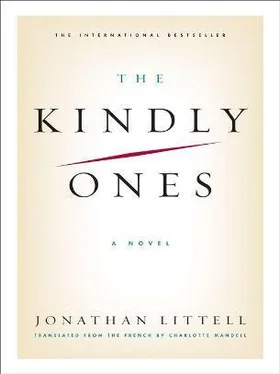Hohenegg got out his Cognac and Weinrowski went to look for glasses; his wife had disappeared into the kitchen. The apartment was dark, with the musty, stale smell of old people’s apartments. I had always wondered where this smell came from. Would I smell that way too, if I ever lived long enough? Strange idea. Today, in any case, I don’t think I smell; but one can never smell one’s own odor, they say. When Weinrowski returned, Hohenegg poured three measures and we drank to the memory of his dead son. Weinrowski seemed a little moved. Then I took out the documents I had prepared and showed them to Hohenegg, after asking Weinrowski for a little more light. Weinrowski was sitting next to his old colleague and commenting on the papers and the charts as Hohenegg examined them; unconsciously, they had slipped into a Viennese dialect that I had trouble following. I settled into my armchair and drank Hohenegg’s Cognac. Both had a rather odd attitude: in fact, as Hohenegg had explained to me, Weinrowski, at the faculty, had seniority; but as Oberst, Hohenegg was superior in rank to Weinrowski, who in the SS had the rank of Sturmbannführer of the Reserve, the equivalent of a Major. They didn’t seem to be sure which of them had precedence over the other, so they had adopted a diffident attitude, with much “If you please,” “No, no, of course you’re right,” “Your experience…” “Your practice…,” which was starting to get rather comical. Hohenegg raised his head and looked at me: “If I understand correctly, according to you, the inmates don’t even receive the complete rations described here?”—“Aside from a few privileged ones, no. They lose at least twenty percent.” Hohenegg resumed his conversation with Weinrowski. “That’s bad.”—“It certainly is. That gives them between thirteen hundred and seventeen hundred calories a day.”—“It’s still more than our men in Stalingrad.” He looked at me again: “What are you aiming for, in the end?”—“The ideal thing would be a normal minimum ration.” Hohenegg tapped the papers: “Yes, but if I understood correctly, that’s impossible. Lack of resources.”—“In a way, yes. But we could suggest improvements.” Hohenegg thought: “In fact, your real problem is the argumentation. The inmate who should receive seventeen hundred calories only receives thirteen hundred; in order for him actually to receive seventeen hundred…”—“Which is insufficient in any case,” Weinrowski interjected.—“…the ration would have to be twenty-one hundred. But if you ask for twenty-one hundred, you have to justify twenty-one hundred. You can’t say you’re asking for twenty-one hundred in order to get seventeen hundred.”—“Doktor, as always, it’s a pleasure talking with you,” I said, smiling. “As is your wont, you go straight to the heart of the matter.” Hohenegg went on without letting himself be interrupted: “Wait. To ask for twenty-one hundred, you would have to demonstrate that seventeen hundred wasn’t enough, which you can’t do, since they don’t actually receive seventeen hundred. And of course, you can’t take the diversion factor into account in your arguments.”—“Not really. Management knows the problem exists, but we can’t get mixed up in it. There are other authorities for that.”—“I see.”—“In fact, the problem is to obtain an increase of the overall budget. But the people who manage that budget think that it should be enough, and it’s hard to prove the contrary. Even if we demonstrate that the inmates continue to die too quickly, they tell us that throwing money at the problem won’t solve it.”—“In which they aren’t necessarily wrong.” Hohenegg rubbed the top of his skull; Weinrowski was silent and listened. “Couldn’t we modify the distributions?”—“Meaning?”—“Well, without increasing the overall budget, favor the working inmates a little more, and the ones who don’t work a little less.”—“In principle, dear Doktor, there are no inmates who don’t work. There are only sick inmates: but if they are fed even less than they are now, they would have no chance to recover and become fit for work again. In that case, might as well not feed them at all; but then the death rate would increase again.”—“Yes, but what I mean is that you must keep the women and the children somewhere? So they must be fed too?” I stared at him without replying. Weinrowski too remained silent. Finally I said: “No, Doktor. We don’t keep the women, the elderly, or the children.” Hohenegg opened his eyes wide and looked at me without replying, as if he wanted me to confirm that I had indeed said what I had said. I nodded. Finally he understood. He gave a long sigh and rubbed the back of his neck: “Well…” Weinrowski and I still remained silent. “Ah yes…yes. That’s rough.” He breathed heavily: “Well. I see how it is. I imagine that, after all, especially after Stalingrad, we don’t have much of a choice.”—“No, Doktor, not really.”—“Still, that’s hard. All of them?”—“All those who can’t work.”—“Well…” He pulled himself together: “At bottom, it’s normal. There’s no reason for us to treat our enemies better than our own soldiers. After what I saw in Stalingrad…. Even these rations are luxurious. Our men survived with much less. And also, the ones who survived, what are they getting to eat now? What are our comrades in Siberia getting? No, no, you’re right.” He stared at me pensively: “Still, it’s a Schweinerei , a filthy business. But still, you’re right.”
I had been right, too, to ask his opinion: Hohenegg had understood right away what Weinrowski couldn’t see, that it was a political problem, not a technical one. The technical aspect had to serve to justify a political decision, but couldn’t dictate it. Our discussion that day reached no conclusions; but it made me think, and in the end I found the solution. Since Weinrowski seemed incapable of grasping it, to keep him busy I asked him to develop another report, and turned to Isenbeck for the necessary technical support. I had underestimated this boy: he was very keen and turned out to be fully capable of understanding my thinking, and even of anticipating it. In one night of work, alone in our big office at the Ministry of the Interior, drinking coffee brought to us by a drowsy orderly, we sketched the rough outlines of the project together. I started with Rizzi’s concept, setting up a distinction between skilled and unskilled workers: all rations would be increased, but just a little for the unskilled workers, while skilled workers could receive a whole series of new advantages. The project didn’t deal with the different categories of inmates, but allowed, if the RSHA insisted, for the categories meant to be disadvantaged, such as the Jews, to be assigned solely to unskilled jobs: in any case, the options remained open. Starting from this central distinction, Isenbeck helped me define others: heavy labor, light labor, hospitalization; in the end, it formed a scale to which we merely had to index the rations. Instead of struggling with fixed rations, which in any case could not be guaranteed because of restrictions and difficulties in obtaining provisions, I asked Isenbeck to calculate—based on standard menus—a daily budget corresponding to each category, then, in addition, to suggest various menus that would correspond to these budgets. Isenbeck insisted that these suggestions also include qualitative options, such as distributing raw onions rather than cooked ones, because of the vitamins; I agreed. At the bottom line, there was nothing revolutionary about this project: it took the current practices and modified them slightly to try to produce a net increase; in order to justify it, I went to find Rizzi, explained the concept to him, and asked him to write an economic argument for me in terms of output; he immediately agreed, all the more so since I readily attributed authorship of the key ideas to him. For myself I reserved the drafting of the project, once I had all the technical elements in hand.
Читать дальше










